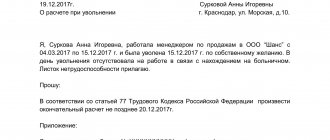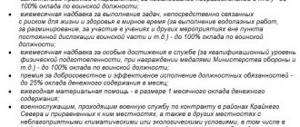Let's consider the reasons for the dismissal of military personnel and options for the development of events with the TsZHZ (targeted housing loan), if it has already been taken. Whether you will have to return funds from your own pocket to the state and the bank depends on your length of service and whether the grounds for termination of service were preferential or not.
What happens to a serviceman’s savings and military mortgage payments after leaving his position if the person did not take out a loan? Who is entitled to subsidies, who is not and why? All these nuances are regulated by Federal Law No. 117-FZ.
IF THE MORTGAGE WAS NOT TAKEN DURING SERVICE
If a participant in the NIS (savings-and-mortgage system) did not have time to use the funds received from the state before dismissal, after resignation, you can use the collected amount to purchase housing or other purposes. This can be done by a military man or members of his family if he himself is killed or declared missing.
The presence or absence of such an opportunity depends on length of service:
The right to manage savings and receive additional compensation payments
Personal savings can be used to purchase real estate or withdrawn from the account by submitting a report and spent on any needs at your discretion.
A serviceman has the right to receive money accumulated in a personal account and spend it both on the purchase of real estate and for other purposes, but only in the event of his resignation on preferential terms. In addition, he can receive additional funds to compensate for the years missing before 20 years of service.
In the absence of valid reasons, all accruals under the NIS program are returned to the state.
Personal savings “burn out” - a former military man cannot claim them.
Military mortgage upon dismissal with 20 years of service
A participant in the savings-mortgage system, having served in the army for 20 years, including in preferential terms, receives the right to money that has accumulated in a personal account. Now he can resign for any reason and retain the right to a preferential military mortgage. There is no need to return funds back. At the same time, it is important to remember that the 20-year period includes exclusively military service, and not any other (in the Ministry of Internal Affairs, the Federal Penitentiary Service, etc.), which is taken into account only when calculating a pension, reports bryansktoday.ru.
When discharged from the Armed Forces upon reaching 20 years of service, a serviceman is excluded from the register “with the right,” this means that he has no debts to the state when purchasing an apartment on a military mortgage. At the same time, if you still have a debt to the bank, you will have to pay it off yourself. As for additional payments, the serviceman has no right to them. If you want to get information from the original source, go to the military mortgage website, specially developed by Rosvoenipoteka.
After information is received from the military unit that there are no overpayments (for this, the serviceman submits a letter of resignation from the army within five days), the encumbrance in favor of the state on the property is removed.
The mortgage in favor of the bank can be removed only after the owner of the apartment has fully paid off the mortgage loan.
Bank loan debt upon dismissal after 20 years of service
It should be taken into account that when applying for a military mortgage, the loan term is calculated until the borrower is 45 years of age. At the same time, the onset of 20 years of service does not always coincide with the achievement of this age. Many officers reach 20 years of service by the age of 38, and with preferential service, another 5-6 years earlier.
For the first few years of your mortgage, your mortgage payments are interest-only. When a military person purchases an apartment, as with other types of mortgages, most of the debt is paid off closer to the end of the bank loan term. This must also be taken into account.
So, sometimes it happens that, having 20 years of service and leaving the army, a serviceman “with the right” has a large loan debt. And although he has no obligations to the state, he will have to pay off the bank debt on his own.
In the event that a participant in the savings-mortgage system did not purchase housing or did not use the military mortgage program to purchase real estate, then after dismissal with 20 years of service, Rosvoenipoteka transfers funds from the serviceman’s personal account to his personal bank account. A former servant of the Fatherland can use the money at his own discretion; there is no need to account for it.
WHEN DISMISSAL DENIES THE RIGHT TO USE SAVINGS
The entire amount spent on military mortgage payments must be returned if the dismissal occurs under the following circumstances:
- violation of the conditions specified in the contract;
- termination of service on one's own initiative;
- if the person’s length of service is less than 10 years (even if the reasons for resignation are included in the list of preferential ones).
In all three cases, the discharged military man will have to pay the mortgage loan and interest on it himself (at the refinancing rate). It is also necessary to return to the state (namely the Federal State Institution “Rosvoenipoteka”) all spent money from the Central Life Insurance Fund - the down payment and all monthly payments already transferred.
This is given 10 years from the date of resignation; the borrower repays the debt according to the drawn up payment schedule, which includes accrued interest at the rate indicated in the CZL agreement.
If the above conditions are not met, representatives of Rosvoenipoteka and the lending bank may hold the former NIS participant accountable through the court - there is a possibility that the property purchased under a military mortgage will be put up for auction after dismissal. The proceeds from the sale of such housing will be used to repay the loan, the housing estate and pay legal costs.
The remainder of the amount (if any) is transferred to the former NIS participant. If the funds after the sale of the mortgaged housing are not enough to cover the listed expenses, the debtor status of the dismissed military man is retained.
PROFESSIONALS WILL HELP YOU WEIGH ALL THE PROS AND CONS
The conditions of a military mortgage in the event of resignation do not change; simply, depending on its reasons and length of service, either the former NIS participant himself or the state will pay the money to the bank. The same factors determine whether you will have to return the CZH amount.
This is important to know: Military mortgage upon dismissal for health reasons
There are many nuances, if you still have questions, contact our consultants - we will help you sort out possible risks, choose a mortgage with favorable conditions and decide on housing in St. Petersburg and the Leningrad region.
Rights of NIS members
This program operates with the help of the NIS (savings-mortgage system), which was born in 2005, as an attempt to solve the pressing problem of providing military contractors with housing. The previously existing housing program, under which military personnel were supposed to receive apartments in houses built for them, turned out to be ineffective in practice for a number of objective reasons.
Expert opinion
Antonov Viktor Sergeevich
Practicing lawyer with 8 years of experience. Specialization: military law. Recognized legal expert.
The situation is completely different with the modern NIS - its participants, without significant effort, can eventually become owners of their own housing in a period of three to six years.
Members of the NIS have certain rights, and to improve living conditions as described in Article 10. Fed. Law No. 117 cases, they have the right to use accumulated funds from their individual account.
- purchase apartments for the capital listed in their accounts, as well as for the funds mentioned in Article 4 (Part One) of Federal Law No. 117;
- to reimburse the targeted loan taken, a member of the NIS can also withdraw money from his savings account;
- buy a home with a targeted loan and (or) mortgage according to the rules mentioned in Art. 14 and 15th Law No.117;
- an NIS participant can annually receive information about the balances on his individual account from the executive authorities at the place of military service.
Reasons for leaving the army and consequences for mortgages
The reasons why a service member leaves the military can vary, and their results in paying off mortgage debt also vary. In some cases, payments on obligations may be repaid from the state budget, or, conversely, paid from the budget of the recipient of the mortgage loan.
The list of mortgage servicing benefits includes the following circumstances:
- achievement by a serviceman of the maximum period of his work in the Armed Forces;
- reductions associated with operational staffing activities;
- incomplete suitability of the serviceman for official duties;
- a serviceman leaving service due to difficult family circumstances;
- complete unfitness for service.
Military personnel also enjoy certain benefits related to their length of service:
- Officers with more than 20 years of experience who have not used mortgage services can apply additional savings in their accounts at their personal discretion.
- If the length of military service is less than 10 years, the serviceman cannot withdraw his savings, and he will have to return the amount of the TsZZ.
- If a serviceman's service exceeds 10 years, he may qualify for additional payments and savings in his account. And after dismissal, he can use the budget money received and continue to pay the mortgage loan on his own.
Reasons for layoffs and consequences
The reasons for military dismissals can be varied. Let's take a look at them in more detail.
Abbreviation for OSHM
One of the main reasons for the dismissal of a serviceman from the Armed Forces is dismissal due to organizational and staffing measures (OSM).
These measures are aimed at reducing the number of officers and warrant officers from their positions for the following reasons:
- Unfitness for the position held (refusal to demotion entails dismissal);
- Replacing one set of employees with a new one;
- Reduction of positions held by military personnel;
- Reduction of duplicate positions;
- Expiration of the contract.
The above reasons are valid, so in this situation there is a fairly high probability that the accumulated money may remain in the use of the military man.
If there is an outstanding mortgage, it can be paid off with these funds.
Dismissal at your own request
A serviceman can be dismissed from the Armed Forces by personal decision.
Such a reason for dismissal does not leave the officer or warrant officer any rights to use accrued funds and, in accordance with the law, he is obliged to transfer them back to the state.
If the mortgage has not been paid at the time of discharge from the Armed Forces, the military member is obliged to repay it in full.
Dismissal due to end of contract
A serviceman may be dismissed due to the expiration of his contract with the Armed Forces.
This reason is quite valid, because it is not related to the personal desires of the serviceman.
If, at the time of termination of service, a person undergoing military service had an outstanding mortgage loan, then in this situation a loyal mechanism is provided for getting out of the current situation.
Dismissal due to health reasons
A serviceman may be removed from his position due to his inadequacy for health reasons.
This reason for dismissal is also valid, since this fact does not depend on the person undergoing military service.
To establish the fact of non-compliance with the position, a special commission is convened, which issues its verdict.
In this case, depending on the circumstances under which the military man was discharged, the procedure for paying off the mortgage is determined, as well as the right to partially or fully retain the accumulated funds.
Dismissal due to non-compliance with contract terms
The dismissal of a serviceman for this reason is not valid, therefore the existing mortgage is repaid in full with the return of accumulated savings in full.
Leaving service due to non-compliance with the terms of the contract does not provide for any compensation, regardless of length of service and achievements.
Dismissal due to transfer to a new duty station
If an officer is dismissed due to transfer to a new duty station, he is not excluded from the savings-mortgage system, provided that the new duty station is related to military activities.
Otherwise, the serviceman will be removed from the NIS system and must return all funds accumulated in his account.
Dismissal without the right to preferential mortgage terms
In some cases, the NIS participant has to return the used savings to the state. As a rule, this happens if a soldier leaves for the following reasons:
- after submitting an application at your own request;
- in case of failure to fulfill contractual obligations under the mortgage agreement;
- for the benefits of an employee whose service record was less than ten years.
When leaving military service in the above situations, a former member of the NIS must return to the state the funds that he received under a targeted loan. The same amount will include the first payment for the living space and the monthly payments made on the mortgage loan.
In addition, in the future, the serviceman is obliged to repay the remaining debt to the bank within the established time frame.
The former NIS member must pay off his debts to the Federal State Public Institution within up to ten years. After repaying this amount and paying off the bank loan, the encumbrance (restrictions on housing rights) is removed from the former debtor’s living space, and then the officer becomes the full owner of the apartment.
Military mortgage and 10 years (or more) service: dismissal for preferential reasons
If a serviceman purchased housing with a mortgage:
- The CLC and monthly payments made by the government do not need to be returned. You can remove the deposit from your home by monitoring the sending of the relevant information from the unit;
- the balance of the debt to the creditor will need to be repaid yourself. You can use the so-called for this. DOPs (additional funds). The deposit in favor of the bank can be removed by writing a corresponding application. But the pledge can be removed only when the debt to the bank is repaid in full.
If a serviceman acquired housing without a mortgage, only using the funds accumulated in his account:
- There is no need to return the CJZ. The deposit in favor of the Russian Federation can be removed by monitoring the sending of the relevant information from the unit;
- If a serviceman is eligible to receive additional supplements, he will need to write a report on receiving the funds required by law with the accompanying documents attached. Funds that supplement savings can be used in any way you like.
The procedure for paying a mortgage to military personnel after dismissal
What can an officer do to receive payments if he has the right to a subsidy for the purchase of living space? In such a case, the subsidy applicant has the right to receive a certain amount of money from Rosvoenipoteka. To do this, the subsidy applicant must go through the appropriate stages of applying for a mortgage:
- Having received an order for his dismissal, the military man must submit a report to the military unit about the issuance of a certain amount from his personal account.
- The military unit will transmit the required data to the authorities, and then this information goes to Rosvoenipoteka.
- The data will be processed, and within one month the warrant officer or officer can receive a transfer from his savings account.
- In addition, if a military man is included in the list of persons entitled to benefits for payments upon dismissal, then he will receive the right not only to receive a certain amount from an individual account, but also to additional subsidies for the purchase of the living space he needs.
- Only officers who do not use housing on social rent or are already owners of housing can apply for government subsidies after dismissal.
As a result, it turns out that officers whose service in the Armed Forces is at least 20 years old, and those officers and warrant officers who retired for preferential reasons after 10 years of service can use the military lending service upon dismissal. In addition, if the length of service is 20 full years, then the military man has the right to use the NIS credit as he sees fit. The same rights are available to career officers with at least 10 years of service, who were also dismissed for a reason falling under the list of benefits. In case of such dismissal, if the serviceman’s service is 10 years, he also has the right to the capital accumulated in his personal account.
The recipient of the loan may not give this money to the state, but he is obliged to pay the rest of the mortgage himself, while retaining the right to compensation. Of course, if he does not use an apartment received on a social loan. In such a situation, he will retain a preferential interest rate.
This is important to know: How to get a company apartment for employees
Dismissal with retention of rights to use savings.
A serviceman has the right to use accumulated funds if his service period is more than 10 years and he is dismissed on preferential grounds: for health reasons, due to organizational and staffing measures (downsizing), for family reasons, upon reaching the maximum age for military service. In the event of the death or death of a serviceman, his relatives will be able to use these savings.
When the right to use savings arises, the military man is paid all the funds available on his tax account at the time of dismissal. Payments are made by the Federal State Institution "Rosvoenipoteka", the procedure for the applicant is as follows:
- After issuing an order for dismissal from service, the serviceman writes a report addressed to the commander of the military unit about the transfer of the specified savings;
- The commander of the military unit submits information about him to the military command and control authorities, and they, in turn, to Rosvoenipoteka;
- “Rosvoenipoteka” transfers funds from the Tax Administration to the bank details specified in the report within 30 days.
Not all military personnel know that upon dismissal for the above reasons, they have the right not only to receive savings from the National Tax Service, but also funds that supplement savings for housing. Additional funds are paid in the following cases: the serviceman is not an employer or a family member of a housing tenant under a social rental agreement, as well as the owner of housing or a member of the owner’s family (with the exception of housing purchased under the military mortgage program).
This is interesting: Military mortgage during divorce, judicial practice 2021
The amount of additional payments is determined based on:
- the amount of the annual savings contribution for an NIS participant (in 2013 – 222,000 rubles);
- the period that the serviceman has not completed up to 20 years from the date of dismissal.
Payment of these funds is carried out at the last place of service of the NIS participant once for the entire period of military service.
The applicant's procedure is as follows:
- After issuing an order for dismissal from service, the serviceman writes a report addressed to the commander of the military unit to request additional funds;
- The commander of the military unit makes a decision within a month on the payment of the specified funds or refuses to pay. The serviceman must be notified in writing about the decision made;
- If a positive decision is made, the amount of payments is calculated, and the higher military authority makes the payment within 3 months.
A military mortgage after dismissal on non-preferential grounds, if the service period exceeds 10 years, assumes that the serviceman can take advantage of savings on the National Security Service. They do not return to the budget, but the former military man then pays off the mortgage himself. The only advantage of this situation is that the borrower continues to have a preferential interest rate on the loan: the Central Bank refinancing rate + 2% per annum, at the moment it is 10.25% (8.25% + 2%).
If the military man does not repay the debt
If an officer who is a member of the NIS terminates his contract before his service has reached 20 years, he is obliged to:
- Pay off debts by paying the entire amount from personal funds. The lending party has the right to change the amount of monthly payments in the manner prescribed for borrowers who do not participate in the investment system.
- The mortgage payer must return the money with interest on the housing target loan, which was provided by ROSVOENIPOTEKA for the first payment of the installment for the living space and repayment of the loan (repayment of the mortgage loan occurs within a period of no more than ten years). Debt repayment is carried out with the accrual of interest specified in the agreement on the provision of CLP, in equal monthly payments.
- If a serviceman refuses to pay for the CLC and the loan, then these amounts will be collected from him forcibly, in the manner prescribed by law. Due to the fact that the purchased living space, as a rule, acts as collateral for the loan, the lender has the right to demand the sale of the borrower’s housing under the hammer. And the proceeds from the sale of this property will partially or fully go to the creditor in the form of debt payment.
If the fired person enters into a new contract
Many military personnel have a question about what happens to the money listed in their savings accounts or with mortgage loans in cases where:
- a serviceman retires from his place of service;
- the military man is removed from the list of participants in the investment system, but goes back to serve;
- an officer or warrant officer is listed in the investment register, but wants to change his place of service.
After an officer resigns, he is automatically excluded from the NIS lists, and his savings account is closed.
The further fate of these funds depends on his length of service and the reason for his resignation. If one of the reasons was:
- dismissal for health reasons;
- OSH processes (organizational and staffing events) that occurred in its part;
- problematic family circumstances;
- retirement from service due to age,
– the state considers these circumstances to be valid, and the savings are subject to restoration. If he quit for another reason, then the funds are not restored and must be returned to the federal budget.
The same is the case with the CJZ agreement: the money must be returned in installments of up to ten years, plus interest at a special rate of the Central Bank of the Russian Federation, which will be calculated from the date of the officer’s dismissal.
When a new contract is concluded, the officer’s data is necessarily entered into the register of the investment savings system, and cash proceeds are transferred to the newly created account.
For officers who have re-entered service in the Armed Forces, there are three compelling circumstances for re-entering them into the registry:
- Restoration of funds in a personal savings account occurs if officers came to serve from the reserve after they were excluded from the register due to leaving military service.
This could happen for the following reasons:
- due to poor health;
- due to circumstances related to OSH;
- on problems related to family;
– if they have not previously received payment of savings funds.
- The law does not provide for the restoration of savings if warrant officers or officers at one time did not wish to become members of the state mortgage system, or they were excluded from the register for reasons that are not considered valid.
- If they were enlisted in the ranks of the Armed Forces from the reserve, removed from the registry and received additional payments, they can be included again in the registry after twenty years of military service.
Based on the material described above, we can conclude that a military mortgage upon dismissal is a relevant and convenient system for those who want to eventually provide themselves and their family with housing with a minimum expenditure of their own funds. In the conditions of the modern housing market, which is growing in price, such assistance from the state is very relevant for army veterans and for young military personnel who have recently entered service.
If you have any questions about military mortgages, you can ask a lawyer on the website. Get a free consultation right now in a special form.
Or leave them in the comments. Please also click on the social media buttons and subscribe to our news updates.
What happens to savings in the event of dismissal?
Military personnel who used money from the government program fear that if their contract is terminated, they will lose their savings. What's really going on? The answer is that it may depend on the reasons for leaving military service.
The grounds for dismissal are divided into preferential and other. These may be the following privileges:
- the serviceman has served the maximum period in the army;
- reduction in organizational staffing activities;
- complete or incomplete unsuitability for further service and performance of immediate duties;
- for family reasons, when there is a need to care for a seriously ill relative.
If the reason for leaving service was one of the above reasons, and the person did not have time to take advantage of the program to purchase real estate, then he retains the right to receive savings and additional payments. This requires that he serve in the Armed Forces for more than 10 years.
When does a serviceman have to return money to the state?
- has more than 20 years of military service (the article may not be respectful at all, up to the NUC);
- has more than 10 years of military service and is dismissed on preferential terms (there are 4 of them);
- is recognized by the medical commission as unfit for further service (completely unfit for military service) regardless of length of service.
- independently expressed a desire to resign with less than 20 years of service, incl. in preferential terms;
- violated the terms of the contract with less than 20 years of service, incl. in preferential terms;
- dismissed on preferential terms, but their military service has not reached 10 years.
Expert opinion
Antonov Viktor Sergeevich
Practicing lawyer with 8 years of experience. Specialization: military law. Recognized legal expert.
“Military Relocation” is a navigator for military mortgages throughout Russia. The latest trends in the field of savings and mortgage system, exclusive solutions and maximum benefits for military personnel when purchasing finished and under construction housing.
This is important to know: Military mortgage: what amounts do banks give
Apartments, townhouses, houses on land. Review of all possible housing options according to the NIS.
Legal support and judicial protection of military personnel. “Military relocation” is a military mortgage in a new way!
What happens to the mortgage after dismissal?
Since the reasons for leaving the armed forces can be different, the mechanisms for repaying an existing mortgage, as well as repaying a targeted housing loan, are also different.
If a serviceman left the army for a valid reason:
- In connection with organizational and staffing events;
- For personal reasons;
- For health;
- Reaching retirement age.
And at the time of dismissal he has an outstanding mortgage, the main deciding factor in this situation is the length of service.
For persons who served in military service for more than twenty years and were discharged due to reaching a certain age, the right to use the accumulated money is retained.
Moreover, if the military man has no obligation to pay the mortgage, these funds can be used for the military man’s personal purposes (to purchase a car or other property).
If an officer (warrant officer) left the army for a good reason and his service record is more than ten years , the existing mortgage is also repaid from the funds accumulated in the serviceman’s account.
There are several scenarios for the development of mortgage repayment after a military man was discharged from service for one reason or another.
| Ways of repayment | Reasons and circumstances of dismissal |
| The mortgage is repaid using savings funds | More than 20 years of service, discharged due to general misdemeanor |
| The balance of the mortgage is paid on your own. Can count on additional compensation | More than 10 years of service, discharged due to general misdemeanor |
| Savings funds are returned in full, the mortgage loan is paid independently without the possibility of receiving compensation. | Less than 10 years of service, regardless of reasons or circumstances. |
to contents
Retirement after 20 years of service or more
After reaching 20 years of service, an NIS participant has the right to resign of his own free will or for any other reason, without repaying the targeted housing loan funds. It is believed that the serviceman earned money that the state allocated to him for the purchase of housing. For those who have exceeded 20 years of service after dismissal, the following rules apply:
- the serviceman is excluded from the NIS register with the “right” to savings;
- no additional payments are due;
- if savings are insufficient, the debt to the bank is repaid from one’s own funds;
- The encumbrance in favor of the state on the property is removed after final settlement with the bank.
It happens that an NIS participant has not purchased housing during his 20-year service life or has not used his savings to purchase real estate. In this case, Rosvoenipoteka transfers the money to the personal account of the employee, who has the right to spend it at his own discretion, without reporting to the state.
Paying off debts after leaving military service
In connection with the law, there are special mechanisms for repaying the debt obligations of military personnel who have an outstanding mortgage at the time of their dismissal.
Persons expelled from the Armed Forces due to:
- Organizational and staffing measures;
- Recognized by a special commission as unfit for health reasons to continue further military service;
- For personal reasons;
- Upon expiration of the contract.
And those who served more than ten years pay off the balance of the unpaid mortgage with the funds remaining on the savings balance.
Military personnel whose service life at the time of dismissal from the army did not exceed ten years pay the remaining amount independently without the right to use accruals and are required to return these funds in full, regardless of the reasons for leaving service.
Read also
- Income from investing “has the train left”? Will the military be able to sue the money now?
- A break in contracts and loss of money due to the fault of the person responsible for the NIS - how can a military man take back what is his?
- Large-scale changes in the housing provision of military personnel are being prepared in the Federal Law “On the Status of Military Personnel”
- Certification of military personnel and NUC - what the courts say
- Can a military personnel recognized as needy be removed from the housing register?
- We lost our report and are denied inclusion in the NIS, what should we do?
- Housing subsidy - issues for military personnel. Quick reference.









